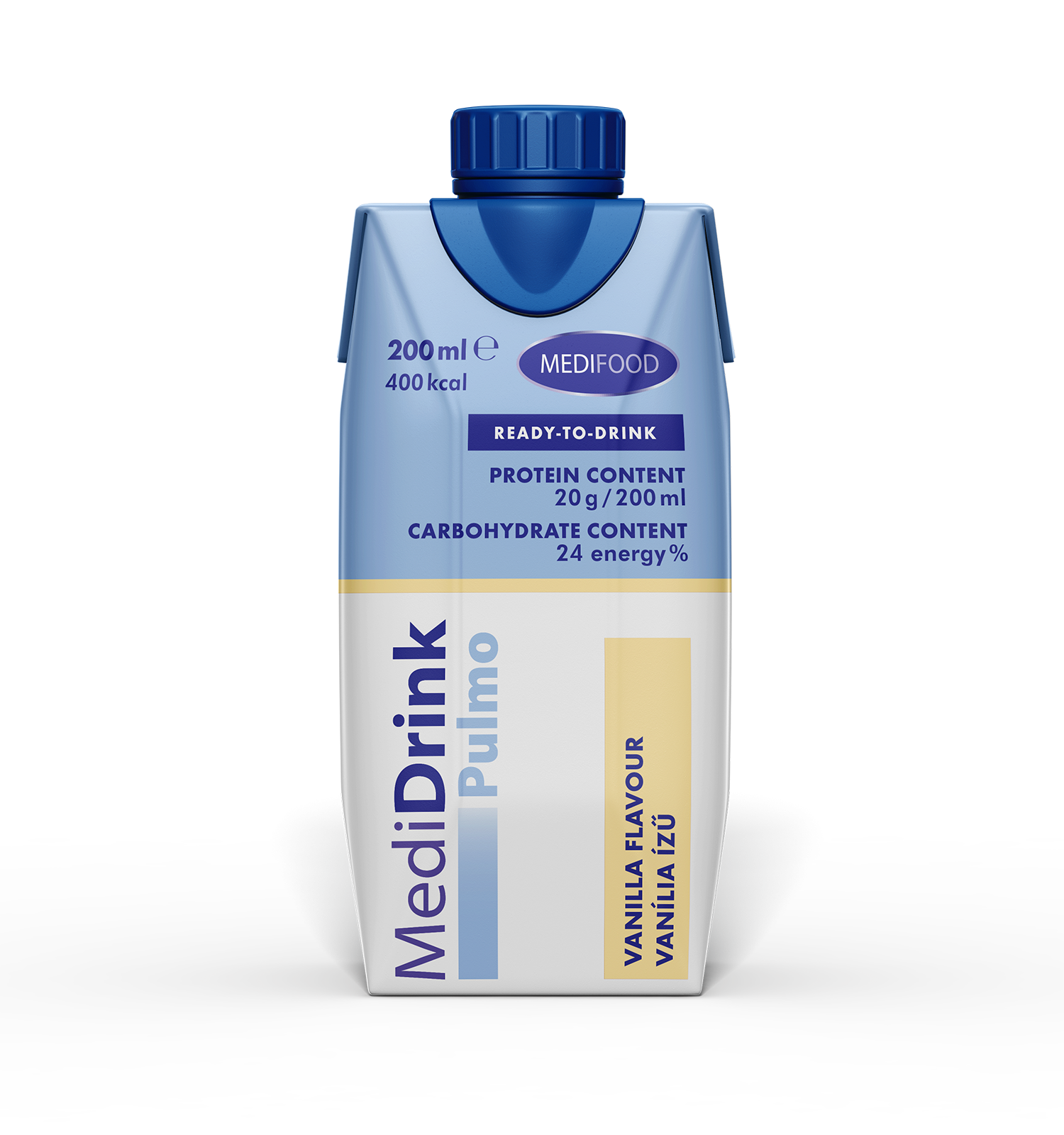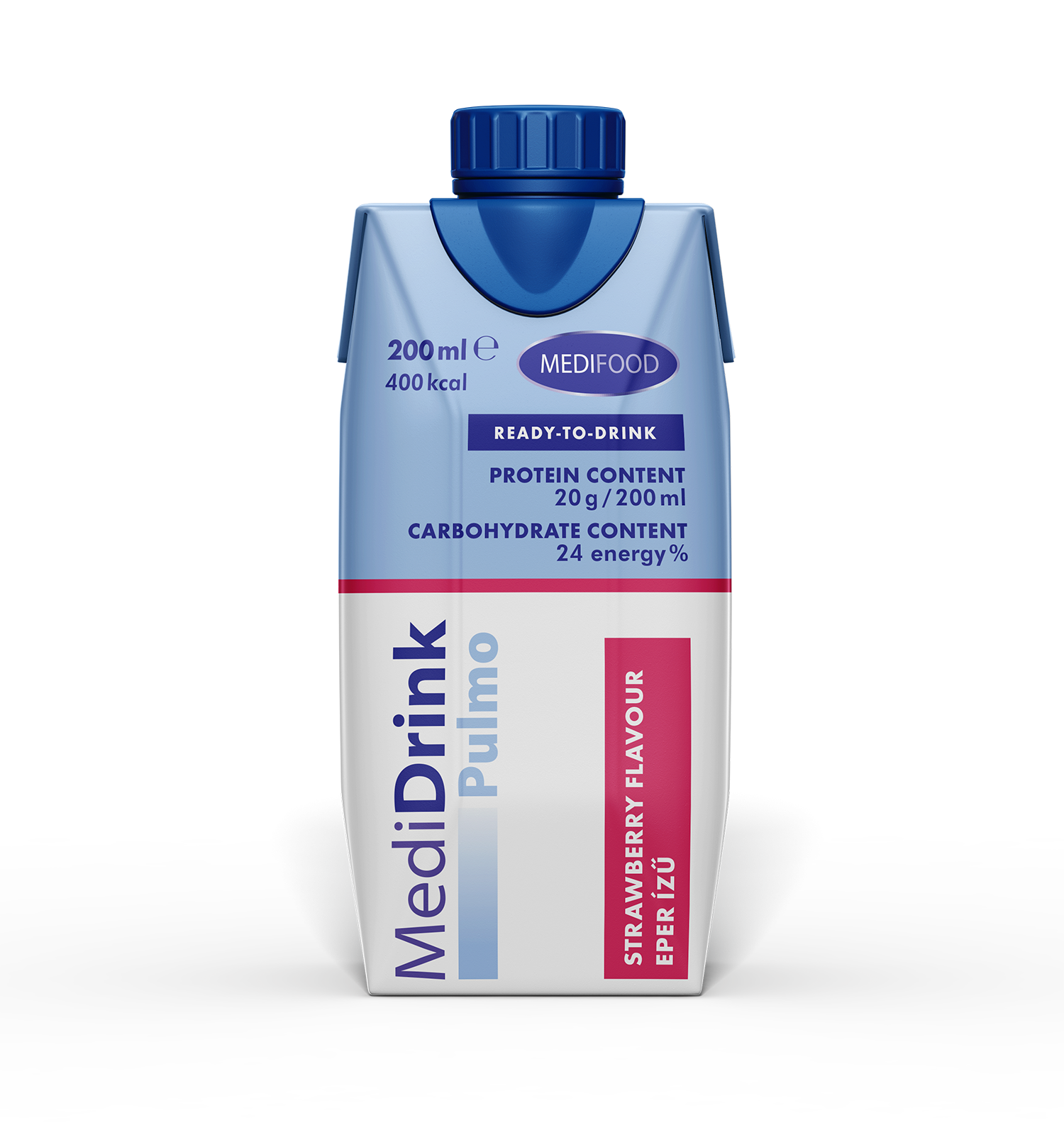MediDrink Pulmo




Better respiration, faster recovery1,2,3,4
MediDrink Pulmo is a condition-specific FSMP that helps improve nutritional status and reduce pulmonory load in COPD patients.
MediDrink Pulmo is a food for special medical purposes for the dietary management of malnutrition in patients with compromised respiratory function.
MediDrink Pulmo is enriched with MCT, and L-carnitine. MediDrink Pulmo is lactose- and gluten-free.
MediDrink Pulmo is a nutritionally complete, high energy (2.0 kcal/ml), high protein (20 energy %), and low carbohydrate (24 energy %), ready-to-drink liquid sip feed.
Flavours: chocolate, strawberry, vanilla
Energy distribution:
- Protein: 20%
- Carbohydrates: 24%
- Fat: 54%
- Fiber: 2%
Suitable as a sole source of nourishment. Recommended daily allowance is 5-6 packs per day for adults as a sole source of nutrition or 2-3 packs per day as supplementatio. Not suitable for children under 3 years of age.
Shake well before use. Best served chilled. Drink slowly in small volumes.
Storage: Should be stored between 2 and 28 °C. Once opened, store in refrigerator and discard unused content after 24hours.
For enteral use only. Must be used under medical supervision. Not suitable for children under 3 years and patients with galactosemia or hereditary fructose intolerance (fructosemia). Use with caution in children aged 3-6 years.
| Average content | unit | per 100ml | per 200ml | per 100kcal | per 100kJ |
| Energy content | kJ | 836 | 1672 | 418 | 99.904 |
| kcal | 200 | 400 | 100 | 23.901 | |
| Fat | g | 12.0 | 24.0 | 6.00 | 1.434 |
| saturated | g | 3.90 | 7.80 | 1.95 | 0.466 |
| monounsaturated | g | 5.60 | 11.2 | 2.80 | 0.669 |
| polyunsaturated | g | 2.50 | 5.00 | 1.25 | 0.299 |
| Carbohydrate | g | 12.0 | 24.0 | 6.00 | 1.434 |
| of which sugars | g | 7.90 | 15.8 | 3.95 | 0.944 |
| of which lactose | g | <0.10 | <0.20 | <0.05 | <0.012 |
| Fibre | g | 2.00 | 4.00 | 1.00 | 0.239 |
| Protein | g | 10.0 | 20.0 | 5.00 | 1.195 |
| Salt | g | 0.35 | 0.70 | 0.18 | 0.042 |
| Minerals | |||||
| Calcium | mg | 268 | 536 | 134 | 32.03 |
| Potassium | mg | 169 | 338 | 84.5 | 20.20 |
| Phosphorus | mg | 151 | 302 | 75.5 | 18.04 |
| Sodium | mg | 139 | 278 | 69.5 | 16.61 |
| Chloride | mg | 128 | 256 | 64 | 15.30 |
| Magnesium | mg | 32.0 | 64.0 | 16.0 | 3.82 |
| Trace elements | |||||
| Zinc | mg | 3.00 | 6.00 | 1.50 | 0.36 |
| Iron | mg | 2.64 | 5.28 | 1.32 | 0.32 |
| Manganese | mg | 0.53 | 1.06 | 0.27 | 0.06 |
| Copper | μg | 290 | 580 | 145 | 34.66 |
| Fluoride | mg | 0.19 | 0.38 | 0.10 | 0.02 |
| Iodine | μg | 27.5 | 55.0 | 13.75 | 3.29 |
| Molybdenum | μg | 16.1 | 32.2 | 8.05 | 1.92 |
| Selenium | μg | 16.0 | 32.0 | 8.00 | 1.91 |
| Chromium | μg | 12.8 | 25.6 | 6.40 | 1.53 |
| Vitamins | |||||
| Vitamin C | mg | 42.0 | 84.0 | 21.00 | 5.02 |
| Vitamin E | mg α-TE | 6.00 | 12.0 | 3.00 | 0.72 |
| Niacin | mg NE | 5.85 | 11.7 | 2.93 | 0.70 |
| Pantothenic acid | mg | 1.70 | 3.40 | 0.85 | 0.20 |
| Vitamin B6 | mg | 0.36 | 0.72 | 0.18 | 0.04 |
| Riboflavin | mg | 0.33 | 0.66 | 0.17 | 0.04 |
| Thiamin | mg | 0.29 | 0.58 | 0.15 | 0.03 |
| Vitamin A | μg-RE | 116 | 232 | 58.00 | 13.86 |
| Folic acid | μg | 60.2 | 120 | 30.10 | 7.19 |
| Vitamin K | μg | 25.6 | 51.2 | 12.80 | 3.06 |
| Biotin | μg | 8.10 | 16.2 | 4.05 | 0.97 |
| Vitamin D | μg | 5.00 | 10.0 | 2.50 | 0.60 |
| Vitamin B12 | μg | 0.92 | 1.84 | 0.46 | 0.11 |
| density | g/cm3 | 1.066 |
Ingredients: water, cow’s milk protein (casein 80%, whey 20%), canola oil, sucrose, coconut oil, isomaltulose maltodextrin, fibre (acacia gum 55%, fructo-oligossacharide 30%), tripotassium citrate monohydrate, stabilizer (E500), calcium carbonate, emulsifier (soy lecithin), L-carnitine, colour (beta-carotene (in case of vanilla flavours)), colour (plain caramel (in case of chocolate flavours)), trisodium citrate, sodium chloride, magnesium carbonate, aroma, L-ascorbic acid, colour( carminic acid ( in case of strawberry flavours)), sodium fluoride, zinc gluconate, ferrous-II-sulphate, DL-alpha-tocopheryl acetate, manganese-II-gluconate, chromium-III-chloride, sodium molybdate dihydrate, potassium iodate, nicotinamide, cholecalciferol, cupric gluconate, sodium selenite, retinyl acetate, calcium D-pantothenate, phytomenadione, D-biotin, riboflavin-5′-phosphate sodium salt, cyanocobalamin, thiamine hydrochloride, pyridoxine hydrochloride, folic acid (pteroyl-monoglutamic acid).
- Efthimiou et al. Effect of carbohydrate rich versus fat rich loads on gas exchange and walking performance in patients with chronic obstructive lung disease. Thorax 1992;47:451-6.
- Frankfort et al. Effects of high- and low-carbohydrate meals on maximum exercise performance in chronic airflow obstruction. Chest 1991;100:792-5.
- Angelillo et al. Effects of low and high carbohydrate feedings in ambulatory patients with chronic obstructive pulmonary disease and chronic hypercapnia. Ann Intern Med 1985;103:883-5.
- Cai et al. Effect of supplementing a high-fat, low carbohydrate enteral formula in COPD patients. Nutrition 2003;19:229-32
